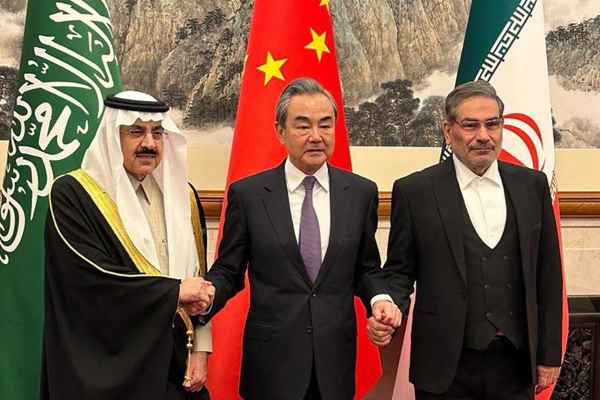Analysis by Bobby Ghosh | Bloomberg
The image is calculated to impress. At a media event in Beijing, China’s top diplomat mugs for the cameras, as the secretary of Iran’s Supreme National Security Council and Saudi Arabia’s national security adviser shake hands. With Chinese encouragement, Iran and Saudi Arabia, the Middle East’s oldest rivals, agreed to resume diplomatic relations.
The underlying message is calculated to surprise: China, long reluctant to involve itself in other people’s problems, is finally prepared to take on the peacemaking responsibilities of a world power. Diving directly into the diplomatic deep end, Beijing is tackling one of the world’s most intractable enmities.
Who could complain about any of this? Even the Biden administration, which is deeply suspicious of China’s growing global ambitions, was compelled to welcome the announcement. “We support any effort to de-escalate tensions there,” said White House spokesman John Kirby. “We think it’s in our own interests.”
But there is less to this tableau than meets the eye. On closer examination, the mediator’s role is overstated, as is the substance of the agreement. The Iranians and Saudis had been working toward a détente for two years, aided by several intermediaries — notably Iraq and Oman. China entered the picture late, after the terms had been agreed. But it suits Tehran and Riyadh to allow Beijing to supervise the final crossing of t’s and dotting of i’s—and to hog the credit. After all, China is the world’s biggest buyer of what Saudi Arabia and Iran have to sell.
The Chinese stamp of approval gives the deal more gravitas than an Iraqi imprimatur, say. An American sign-off was never on the cards, given the longstanding US-Iran animosities, but the Saudis kept the Biden administration appraised of progress throughout.
Progress toward what, exactly? The two sides have agreed to reopen embassies, the better to “clear up misunderstandings” (as Ali Shamkhani, secretary of Iran’s security council, put it) and cooperate over regional security in the Persian Gulf. The first of these is the most certain, ending the standoff that began with the 2016 torching of the Saudi embassy in Tehran by Iranian mobs.
But the presence of full-fledged ambassadors in Tehran and Riyadh did little to ameliorate antagonism in the past. As for regional security, the greatest threat to the Gulf is posed by Iran’s attacks — mostly through proxies in Yemen and Iraq — on Saudi targets. The fox can hardly be trusted to cooperate in the security of the henhouse.
For the agreement to have any substance, the Iranians would have to call off their surrogates in Yemen, where Saudi Arabia has been bogged down in a conflict with the Tehran-backed Houthi militia. That the announcement in Beijing wasn’t preceded, or even accompanied, by an openly stated Iranian promise to this effect is a measure of Riyadh’s desperation to extract itself from the quagmire. It is conceivable that secret assurances have been given, but the Saudis will know not to trust the word of the party holding the catspaw.
The Saudis will also be keenly aware of the direct threat from Iran, whether through its nuclear ambitions (its uranium enrichment program is now within a whisker of weapons-grade output), its production of ballistic missiles of progressively longer range and its reported purchase of state-of-the-art Russian fighter jets. That is why Crown Prince Mohammed bin Salman, the kingdom’s de facto ruler, is now seeking a US security guarantee and access to more American weapons, in exchange for normalization of relations with Israel.
And then there are commercial considerations: Iran’s sanctions-busting exports of crude to China eat into the Saudi share of that market.
Given these hard realities, the agreement announced in Beijing is unlikely to greatly alter the risks of conflict between Iran and Saudi Arabia. But it does give China ownership of a problem nobody else wants. Good luck with that.
Bobby Ghosh is a Bloomberg Opinion columnist covering foreign affairs. Previously, he was editor in chief at Hindustan Times, managing editor at Quartz and international editor at Time.
Bloomberg


Leave a Reply
You must be logged in to post a comment.